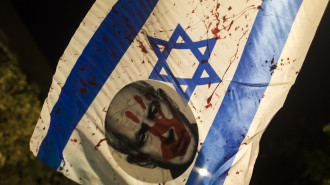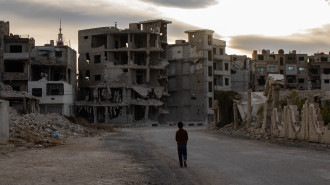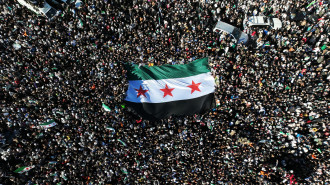Breadcrumb
Syrian opposition battles for control of strategic al-Ghab plain
Syrian opposition forces are looking to capitalise on their recent victories in Idlib and Jisr al-Shughour in the northwest of the country by launching an offensive in the al-Ghab plain, it has emerged.
FSA legal adviser Osama Abu Zaid told al-Araby al-Jadeed that the battle in al-Ghab would be difficult, because it was on open plain surrounded by hills held by regime forces.
"We will see the beginning of the most difficult phase of the battle for al-Ghab plain in the coming days," he said.
Abu Zaid said the battle was part of military operations planned by Jaish al-Fateh, Jaish al-Islam and the FSA after recent opposition victories.
"The battle in al-Ghab did not take place earlier because it is a geographically extensive area. There could not have been any operations in an area of this size without corresponding operations in surrounding areas such as Jisr al-Shughour, al-Arba'in mountain and Ariha mountain."
Strategic importance
The plain is strategically important for the opposition. Taking the area would allow opposition forces that took Idlib and are now fighting in Jisr al-Shughour to the north and forces in Jabal al-Zawiya to the east of the plain to connect with opposition forces to the west in the Latakia region.
To the west, in the northern Latakia countryside, the First Coastal Battalion of the FSA are fighting alongside Islamist factions. They are in control of both al-Turkman and al-Akrad mountains.
The opposition also controls the town of Khan Sheikhoun on the Hama-Aleppo road, while regime forces still control the northern Hama countryside.
| Taking the plain would allow opposition forces to the east to connect with opposition forces to the west, near Latakia. |
The al-Ghab plain, in the western Hama countryside, was relatively calm after the start of the Syrian revolution in March 2011.
However, it has recently witnessed several battles after the Syrian opposition seized control of the city of Idlib.
The fighting is now set to escalate in the area, even though opposition factions and regime forces are both currently focusing efforts elsewhere, especially on the regime's bid to lift the siege on its forces in the Jisr al-Shughour hospital to the southwest, its only remaining foothold in that city.
Al-Ghab plain remains at the heart of the battle, however. As Jaish al-Fateh ["Army of Conquest"] entered Idlib, it sought to cut the city off from the Latakia governorate, especially after seizing the bulk of Jisr al-Shughour, where senior regime commanders remain holed up in the city's hospital - just a few kilometres away from the plain.
Al-Ghab has become a strategic target for both sides. For one thing, the fertile flat expanse watered by the Orontes River is located in central Syria between the mountains of Latakia to the west, al-Zawiya to the east, Jisr al-Shughour to the north, and Masyaf to the south.
The Zeyzoun thermal power station, which supplies al-Ghab and Jisr al-Shughour with electricity, is located on the eastern outskirts of al-Ghab, and this increases its strategic value.
The power station has seen fierce fighting between opposition and regime forces, and has changed hands several times. The opposition has not been able to maintain control of the power station for more than a few hours at a time, as the regime repeatedly launched counter-attacks using airstrikes and barrel bombs, repeatedly forcing opposition forces to withdraw.
Al-Ghab plain is about 80km long and 10km wide. It is surrounded by high mountains, especially to the west. The most important towns and villages located in the plain are Qarqour, Sirmaniyah, Ziara, Jourin, and Salhab.
The 325,000 people who once lived there were a diverse mosaic of Sunnis, Alawites, Ismailis and Murshidis.
After Jaish al-Fateh seized Idlib, the battle spread to Al-Ghab plain in late April. Opposition factions, including the Islamist Ahrar al-Sham ["Free Men of the Levant"], Jabhat al-Sumoud, Suqour al-Ghab, Suqour al-Jabal, and the First Coastal Division overran most regime checkpoints in the plain after three days of fighting.
The opposition seized tanks, armoured personnel carriers, heavy weapons and ammunition, killing more than 30 regime soldiers.
This is an edited translation from our Arabic edition.






![Anthony Blinken speech [Getty] Anthony Blinken speech [Getty]](/sites/default/files/styles/image_684x385/public/media/images/6263436E-8ACD-4D3C-9055-25A7BE79DD5A.jpg?h=d1cb525d&itok=fLHmHCRG)
 Follow the Middle East's top stories in English at The New Arab on Google News
Follow the Middle East's top stories in English at The New Arab on Google News


